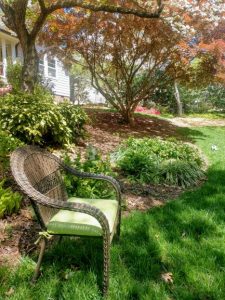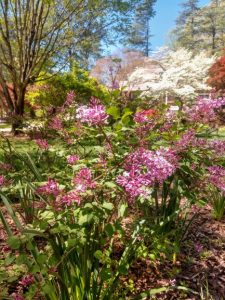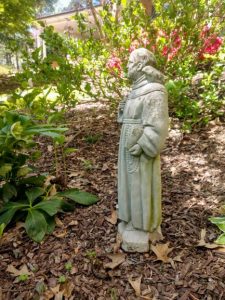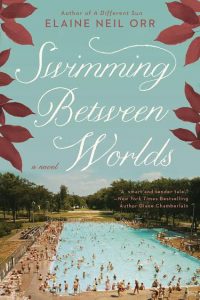Living and Writing and Faith: Dispatch from Self-Isolation, Day 30
 All I want to do is have coffee with my parents under a shade tree.
All I want to do is have coffee with my parents under a shade tree.
It’s day 30 of self-isolating in the era of Covid-19. I’m sixty-five and immunosuppressed (a double-organ transplant patient) so I started drawing back during my spring break from N.C. State. The first week, I went out for groceries and once to the garden shop, where I found, of all things, hand sanitizer—along with the pansies I felt I must have to power through these weeks.
Today, for the first time, I’m depressed. Maybe it’s the one month mark. Maybe it’s the Sunday blues. Maybe my husband and I are getting on each other’s last nerve. Maybe I’m depressed because the number of deaths in the U.S. doubled in the last forty-eight hours.
At first I imagined a bullet discharged from a gun on the other side of the world was barreling to the bullseye of my heart. Now I worry about everyone else.
My parents are dead so I can’t have coffee with them. My father died in 2000, my mother in 2014. Even if they were living, they would be, presumably, self-isolating as I am and in a facility on lockdown.
I want to talk with my parents because they knew things. They lived through a depression as children and survived a world war as young adults. My father served in World War II, flying missions over Germany. My mother went to New Orleans during that war and enrolled in nursing school. She had patients expiring every night and only she and another nursing student to attend to them. Of necessity, my parents learned how to stay calm in catastrophe.
I credit their faith for this ability. They faced what might come with belief: in God, in divine mercies, in the meaning of life. I don’t mean that they were the sort of people who saw God’s hand in a hurricane. Perhaps, having witnessed the arc of the Depression and emerged, they could imagine a beginning, middle, and end of a war. But that in itself isn’t faith. Faith is believing that even death is sustainable because a larger divine Being broods over the world. When the war was over, they thought they should do something to make a better world. They became medical missionaries.
 In Nigeria, my parents wanted more children but my mother had two miscarriages (related to malaria) and however sad they were, they carried on and built rich lives. Two miscarriages seems a small loss only to a person who never had one.
In Nigeria, my parents wanted more children but my mother had two miscarriages (related to malaria) and however sad they were, they carried on and built rich lives. Two miscarriages seems a small loss only to a person who never had one.
But this Covid-19. We’re encountering a death-dealer so indiscriminate, so ruthless, so abundantly everywhere. I could deliver it to my parents on the lips of their coffee mugs if they were here. I can’t sustain that image they shared with Gerard Manley Hopkins of the Holy Ghost “over the bent world brood[ing] with warm breast and . . . bright wings.” (“God’s Grandeur”).
Still, I’ve been doing pretty well so far. I live in North Carolina. My husband and I have a modest house on a corner lot. It’s half an acre. I’ve been weeding and transplanting and clearing out debris and tidying up beds. The days are mild. Dogwoods and azaleas are blooming. Outdoors in sunshine is the best place to be. We have a puppy. My university classes are up on Zoom and I’ve taught for a week and seem to have the hang of it. We have plenty of food and are enjoying our pantry-based dinners of macaroni and cheese and ham and canned green beans, dinners I can easily imagine my parents eating. We’re lucky. So far.
But our loved ones are in other homes and some work and the younger ones go to the grocery and who knows where they might encounter Covid-19: on the soles of their shoes, or the plastic bag handed to them by a clerk, or in their mail boxes. The only thing that frightens me more than dying alone in a hospital and being cremated and buried in isolation is having the same happen to my son or husband or sister. People disappearing. That’s what I fear.
I’m finding it impossible to write. Writing requires faith, not simply in a future but in meaning. I’m in the beginning stages of a novel so it’s all uphill. I’ll need years to finish this book, days or maybe a week to write three good pages. Normally, I would glory in the way time lengthens out in a project like this as I enter another universe. But right now I can’t quite believe that this effort will yield a book or that I can sustain all the deadends and rewrites and revisions that a novel requires of me. Do I have anything important enough to say? Or is getting up and taking on my task the very exercise of faith I recognized in my parents?
***
 A robin steps into my back yard and surveys the territory. There’s a breeze in the air. But my mind feels numb, my eyelids heavy, as if weighted with small metal disks. If only I could will my way into the new novel. Set in 2010, it’s about a woman who is a curator of African art in a town like Raleigh. I call it my “older woman” novel because the character is fifty-five, not twenty-five. I love this woman (I’ll call her Catherine). I love the way a mystery about her past lands on her office desk. I want to go back: to my novel and 2010. My mother was alive in 2010. She was ninety, lucid, laughing, having coffee. She was still reassuring me with the look of love in her eyes.
A robin steps into my back yard and surveys the territory. There’s a breeze in the air. But my mind feels numb, my eyelids heavy, as if weighted with small metal disks. If only I could will my way into the new novel. Set in 2010, it’s about a woman who is a curator of African art in a town like Raleigh. I call it my “older woman” novel because the character is fifty-five, not twenty-five. I love this woman (I’ll call her Catherine). I love the way a mystery about her past lands on her office desk. I want to go back: to my novel and 2010. My mother was alive in 2010. She was ninety, lucid, laughing, having coffee. She was still reassuring me with the look of love in her eyes.
I made coffee for one before I came outdoors. I used to drink it black like my mother but now I warm and froth milk and pour the coffee on top. I’m pretending as if my parents are here. They found great solace in one another and in ritual.
Ritual is part of surviving. Walk the dog. Make a meal. Sit down to eat it and not in front of the television or looking at a phone and certainly not watching Covid-19 news. Have afternoon coffee in the shade and listen to the birds. Any of these rituals can ease depression, though not, I suspect, cure it. They can get us from one day to the next.
*
It’s now dawn of a new day, Monday morning. Blue-gray clouds and a pearl sky fill my window. The birds aren’t singing yet, but they will. Soon, I’ll turn to the novel. I’m determined to get into that other world, for at least two hours. And then I will turn my attention to my students and what I’m going to teach them tomorrow. I made a selection in a literary competition I’m judging and must write up two sentences about the winner. I’ll find a rhythm of life.
I’ll drink tea, walk the dog, eat my morning cereal.
I think it’s time to pray. On the phone last night, a friend suggested that if enough of us hum, we might send a wave through the air that will disrupt the virus. She and I are realists who are trying, still, to believe in the ineffable. I’m willing to try. People are singing in Italy. People are singing in New York. When will we sing in Raleigh? Singing, like praying, isn’t a bid to escape or even an effort to overwhelm the opposition. The purpose of prayer is to slow down and keep breathing in an attitude of expectation. When I was a girl in boarding school in Nigeria, our voice teacher coached us in how to breathe while singing. I learned that I could sing longer when I breathed deeply.
Keep breathing.
*
Reader: It took me three days, but I am here now, on Wednesday, finally, in my novel. My character pulled me back in. She’s so eager to live.
—
Elaine Neil Orr is the author of five books, including her memoir, Gods of Noonday: A White Girl’s African Life, and the novel, A Different Sun. Her latest novel, Swimming Between Worlds captures the moral imperatives of integration in the early 1960s and was a finalist for the 2019 Phillip H. McMath Post-Publication Book Award in Fiction. She has been honored by the National Endowment for the Humanities, the North Carolina Arts Council, and the Virginia Center for the Creative Arts. She serves on the faculty of English at N.C. State University as well as the faculty of the Spalding University School of Creative and Professional Writing.
SWIMMING BETWEEN WORLDS
 From the critically acclaimed writer of A Different Sun, a Southern coming-of-age novel that sets three very different young people against the tumultuous years of the American civil rights movement…
From the critically acclaimed writer of A Different Sun, a Southern coming-of-age novel that sets three very different young people against the tumultuous years of the American civil rights movement…
Tacker Hart left his home in North Carolina as a local high school football hero, but returns in disgrace after being fired from a prestigious architectural assignment in West Africa. Yet the culture and people he grew to admire have left their mark on him. Adrift, he manages his father’s grocery store and becomes reacquainted with a girl he barely knew growing up.
Kate Monroe’s parents have died, leaving her the family home and the right connections in her Southern town. But a trove of disturbing letters sends her searching for the truth behind the comfortable life she’s been bequeathed.
On the same morning but at different moments, Tacker and Kate encounter a young African-American, Gaines Townson, and their stories converge with his. As Winston-Salem is pulled into the tumultuous 1960s, these three Americans find themselves at the center of the civil rights struggle, coming to terms with the legacies of their pasts as they search for an ennobling future.
Category: Contemporary Women Writers, On Writing































That was a lovely post. Honest and true just like you Elaine. You’ve inspired me to go back to journal writing. I have so many ideas for a new book, a novel and a couple of stories that would be in it, but it’s difficult to write and you’re beautiful Writing is leading me at this moment right back to my purple journal. As usual thank you for your inspiration. Take care. Sara
This note is a surprise for you, Elaine. A cheering-up kind of note!
I’ve had several projects to save my sanity during this period of distancing. One has been to read your SWIMMING BETWEEN WORLDS so that I could review it. I had read no reviews before writing mine, so I was entirely true to my feelings.
I will let you know when the review is “live” on Southern Literary Review. I hope you find this news as motivating as reading your novel was to me. I’ve busied myself with editing my forthcoming novella, and have turned my eyes back to both my novels in manuscript–not to mention starting some poems each day this month.
You’re making an excellent step forward with this confession, so get cracking on that novel.
Peace be with you, and cheerio!
Beautiful post, Elaine. Thank you. I’m feeling much of this right now, as is everyone else, I suspect. Wonderful gift to so eloquently give us these words just when we need them.
All three of my children attended NC State. And I am also at the beginning of a novel, the fourth and final book in a funny murder mystery series I write.
Being funny as this moment in time takes a certain amount of faith too, I think. Harder than it looks. Both funny and faith.
Be well, stay home. Brighter days are coming at us sometime in the future.
This is just so evocative. I used to have those same breakfasts and coffees under the trees with my parents and sisters. The olds were so strong, so quietly strong and resilient that I learned strength rather than earned it. I loved them and, yes, we shall all do it again.
Thanks for writing what you shared. It touched my heart. These days it seems many people are thinking of those close to them now or those who have meant something in the shaping and destiny of their lives. Reaching out, sharing or just reminiscing.
This is my first time checking out this website and I truly like it.
I am not a writer I just appreciate women writers. Good Luck with your continued writings.
KIM